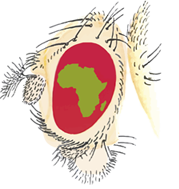Flies in Nigeria
Submitted by linceAn article by A A Adedeji and M Vicente-Crespo on the merits of the fly for biomedical research in Nigeria:
The challenges facing biomedical research and training in Nigeria have remained a huge concern. Asking the right questions that deeply feed into solving the health problems of the people, and using appropriate tools and methodologies have been challenging due to resource constraints including ethical and cost considerations for use of experimental animals. Drosophila Melanogaster is a versatile model organism that has been used for over a century in biomedical research to study wide range of phenomena. Although the fly has about 400 million years of divergent evolution with human, 75% of genes known to be involved in human diseases have homologues in Drosophila. This vital evolutionary conservation, the ease of culturing and manipulating in laboratory conditions and the short life cycle makes Drosophila an important model for biological and medical investigations, and teaching of biomedical sciences. The remarkable advances in molecular and cell biology have added complementary tools for the adaptation of the fly to study various disease conditions, gene regulation and interaction in health and diseases, biological basis of diseases, drug development and evaluation, mechanism of drug actions, and anatomical architecture and pathophysiology in disease states. The strategic deployment of the fly model for research and training in biomedical sciences in Nigeria will provide an affordable, readily available and high impact alternative to the current models and may revolutionize conduct, integrity, quality and applicability of biomedical research in Nigeria and, consequently, the training of health professionals.
